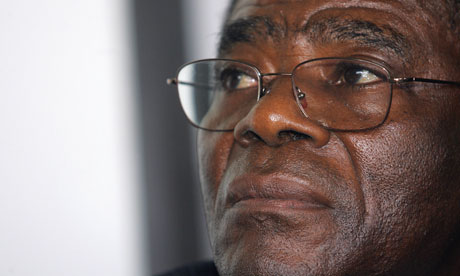Equatorial Guinea is a state situated in Middle Africa. With an area of 28,000 square kilometres (11,000 sq mi), Equatorial Guinea happens to be one of the smallest states in Africa. It is composed of two parts, a mainland and an insular region. The mainland region, Río Muni, is bordered by Gabon on the south and east and Cameroon on the north. The insular regionis composed of the islands of Bioko (formerly Fernando Pó) in the Gulf of Guinea and Annobón, a small volcanic island south of the equator. Bioko island is the northernmost part of Equatorial Guinea and is the site of the country's capital, Malabo.
Equatorial Guinea is one of sub-Saharan Africa's largest oil producers. It has a population of 685,991 (July, 2012). It is the richest state per capita in Africa, and its gross domestic product (GDP) per capita ranks 69th in the world. However, the wealth is unevenly distributed and just a few people have benefited from the oil riches. According to the United Nations, less than half of the population has access to clean drinking water and that 20% of children die before reaching five.
On the 25 of July 2013, the government of Equatorial Guinea announced that the state had suffered from a shortage in petroleum products especially fuel. This news came as a big shock to Africa and the whole World. According to a report from the Economist dated 25 July 2013, tensions between France and Equatorial Guinea are set to rise as the regime blames a French company for the shortages.
Some experts were invited over the weekend to a special programme to the popular broadcasting station of France 24, to share their views on why Equatorial Guinea has to suffer from fuel shortages despite its oil rich status. Some of these experts were of the view that the West especially France has always had a strategy to distabilise regimes in Africa by making the population riot against these said regime. These analysts added that France caused the fuel shortages to make the population of Equatorial Guinea riot against the regime in power. Other invited analysts added that the regime in power was the cause of fuel shortages. For long now, just a few corrupt officials have benefited from the proceeds of oil and gas production in Equatorial Guinea. Oil and gas multinationals especially from France have been given the lee way to manipulate regimes at the expense of the populace.
In as much as the government of Equatorial Guinea blames France for fuel shortages, the bigger share of the blame rests with the government of Equatorial Guinea. This was a scenario which was foreseeable especially as the state allowed few corrupt individuals to benefit from the oil and gas sector in Equatorial Guinea. The state of Equatorial Guinea like many other states rich in oil and gas in Africa, has allowed multinationals from the West in complicity with the World Bank and International Monetary Fund, to manipulate oil and gas production as well as the prices of finished products. Despite the oil and gas wealth in Africa, states like Equatorial Guinea are still plagued by underdevelopment.
Africa can indeed benefit from oil and gas if the people and not corrupt government officials are put first. States in Africa like Equatorial Guinea need to start rethinking their development policy especially in the oil and gas sector. Local content needs to be developed and invest in. Talking about local content and holding workshops on local content is not enough. Africans need to be adequately employed and remunerated in the oil and gas industry. Africans especially Equatorial Guineans need to be involved in deciding on policy on fuel prices, especially as these products are necessary for human survival. Such measures can save Africa and Equatorial Guinea from an aberration.
Chofor Che is an integral part of the Africanliberty’s Voice of Liberty initiative. He is also a Doctoral Law candidate at the Faculty of Law, University of the Western Cape and blogs at http://choforche.wordpress.com/.
[photo: President Teodoro Obiang of Equitorial Guinea, credit: UK Guardian]


